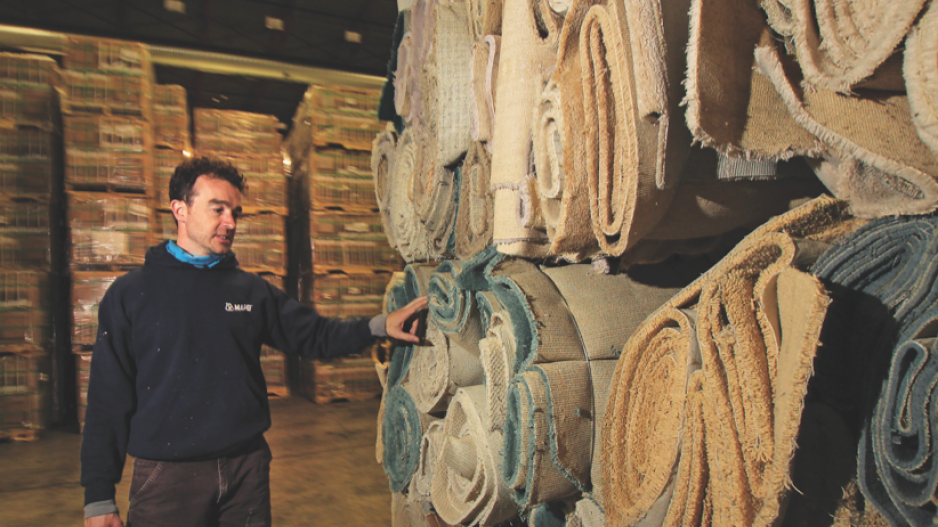Approximately 43,000 pounds of carpet was installed in the Vancouver Convention Centre for last month’s annual TED conference, and at the end of the five-day show, all of it was ripped out. Thanks in part to a Richmond company, it was diverted from the landfill and will be recycled.
Peter Cox owns and operates PAC Recycling, which claims to be “Vancouver’s only carpet and underlay recycler.” It’s also one of only two carpet recyclers in Canada.
Because there are no carpet-processing facilities in Canada, the recyclable material Cox receives must be sent to Asia or the United States, and because each fibre type requires a different recycling process, each processor focuses on one type. Ensuring the right fibre is sent to the right place is challenging and time-consuming.
“With paper, cardboard, plastic containers, metal, they’re all uniform materials,” Cox said. “Those processes have been around for decades now. Any time in recycling that you get into a mixed-material situation it becomes a real challenge. The costs go up.”
Cox has thus far hired one employee, and while he says the company is profitable and expansion is in the cards, he’s limited by his shipping capacity.
Recent port congestion in Asia and along the west coast from the recent U.S. longshore labour dispute has made things difficult.
Storage and collection of the material are also a challenge.
PAC relies on flooring installers to separate carpet from trash, then deliver it to PAC’s collection point.
“In the U.S., the biggest collectors will place a 50-foot trailer outside and dealers will fill that up,” Cox said.
“There’s no one in Vancouver that has that kind of space. Even the biggest flooring operations here are lucky if they have two dock doors.”
South of the border, carpet recycling is larger, but no less challenging. Trade group Carpet America Recovery Effort (CARE) represents flooring manufacturers and retailers as well as recycling collectors and processors.
According to CARE director of operations Anthony Cline, falling oil prices have made it hard for recycled material to compete with newly produced “virgin” carpet.
Cline estimated that there are 70 to 80 carpet collection points in the U.S. and approximately eight processors.
In CARE’s 2013 annual report, the most recent available, the group claims 534 million pounds, or 14%, of discarded carpet has been diverted from landfills. Of that, 197 million pounds of carpet is recycled; the rest is converted to fuel or other uses.
According to Cox, about 60 million pounds of carpet from Metro Vancouver goes into landfills each year, but there’s no recycling plan in place.
“It’s not an industry where you can make a quick buck,” Cox said. “You have to be in it for the long term and be very careful with how you’re putting up money.” •




